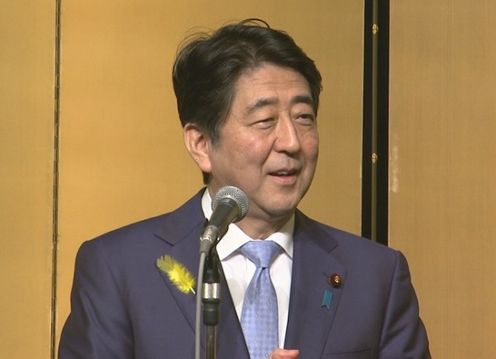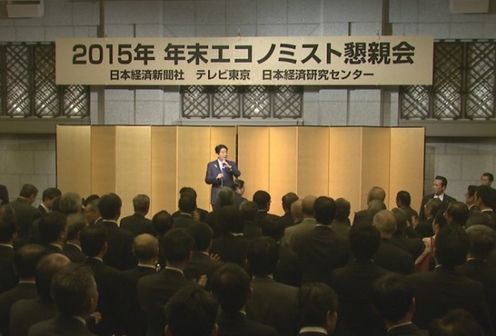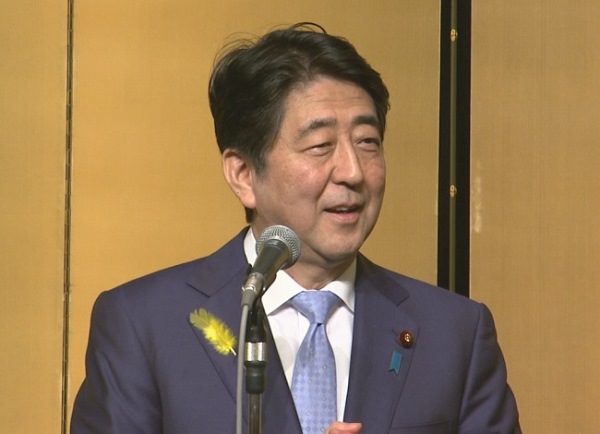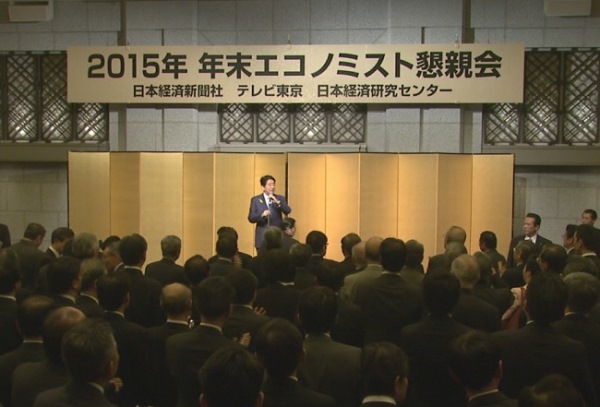Home > News > The Prime Minister in Action > December 2015 > Year-End Economist's Party
The Prime Minister in Action
Year-End Economist's Party
December 8, 2015

Photograph of the Prime Minister delivering an address (1)

Photograph of the Prime Minister delivering an address (2)
[Provisional Translation]
Prime Minister Shinzo Abe attended the Year-End Economist's Party, held in Tokyo.
Prime Minister said in his address,
“Good evening. I am Shinzo Abe.
This morning, there was good news. The primary economic forecast for the July-September period was revised considerably, from negative 0.8 to positive 1. As an annual rate, I believe that a change from negative 0.8 to positive 1 is a substantial one.
The adage for the market this year was “Year of the Sheep: Patience.” There may be some among you who believe that the market itself is also undergoing a slight mood of patience, and you too have shown patience yourselves. This year we publicly listed the shares of Japan Post Co., Ltd., which helped make the market a little more lively.
We are approaching the end of the third year since the inauguration of the Abe Cabinet. This year companies are showing their greatest profits, while the greatest benefit from a political standpoint is in employment, where the ratio of job offers to job seekers is at its highest level in 23 years. During this past year, we have focused on regional vitalization, and the ratio of job offers to job seekers reached record highs in seven prefectures, namely Aomori, Akita, Kochi, Tokushima, Fukuoka, Kumamoto, and Okinawa Prefectures. In Kochi Prefecture, for example, the ratio of job offers to job seekers reached 1.0 for the first time since these statistics were first compiled in 1963. I hear they had a toast at the Kochi Prefectural Office to celebrate this achievement. The most important thing from a political standpoint is to create employment. I believe there is nothing more important than making employment conditions as favorable as possible. In regard to salaries, with the ongoing support of business managers, wages have increased to achieve a level of payment that is the highest in 17 years. I earnestly hope that this trend continues through next year.
In regard to the supplementary budget, we have formulated a budget of 3.5 trillion yen. I would also like to formulate a budget of 1 trillion yen for creating a society in which all one hundred million-plus citizens are each dynamically engaged. Minister of Health, Labour and Welfare Shiozaki has been working very hard on this. The creation of a society in which all one hundred million-plus citizens are each dynamically engaged truly represents a proposal for a new socioeconomic system that will create a positive cycle of growth and distribution. The Japanese economy has steadily grown, and one of the fruits of the growth reached over the last three years is the increase in tax revenues, amounting to an increase of 12 trillion yen. Moreover, recently it has become clear that there are signs of further increases. We will thoroughly use this increase in tax revenues to provide child-rearing support in order to realize the desired birthrate of 1.8 children per woman, and to provide the social welfare needed to ensure that the number of people who leave employment to provide nursing care is reduced to zero. Furthermore, by directing investment to sources of growth, we can achieve growth based on an even more stable social structure. Moreover, we will create a society characterized by diversity. A diverse society is one in which everyone can play a role. That creates new ideas, and further, stimulates innovation, giving us more fulfilling lives. This will lead to consumption, investment, and new growth. By creating this positive cycle of growth and distribution, we will certainly create even greater growth, and there will be ample reason to believe that we can indeed achieve a nominal GDP of 600 trillion yen.
This year was a year of major reforms. For example, a major reform of agricultural cooperatives was implemented, the first in 60 years. Also, we achieved an agreement in principle on the TPP. It was said many times that the TPP would flounder, but even so, Japan and the United States took leadership, enabling the agreement in principle to be achieved. In the medical field as well, we have undertaken significant reforms. Moreover, we are implementing the full liberalization of the electricity retail market. We will continue to further advance such reforms. We will steadily make Japan the easiest country in the world for companies to do business in. I would like to make Japan a more dynamic country.
I would like you to take all of this into account when making next year’s forecasts, and I wish you all an excellent 2016. Thank you.”


